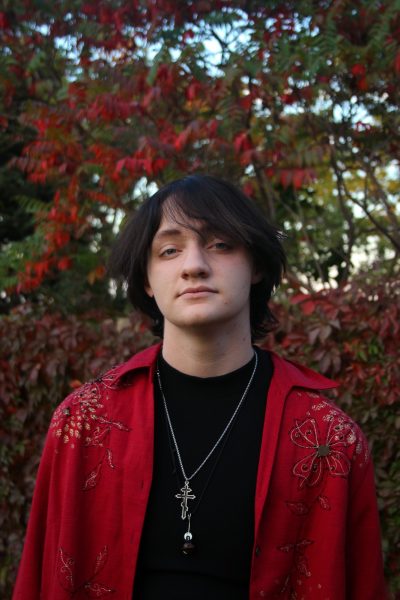Just stop thinking about it.
“I kinda can’t, I’m so sorry. I wish I could, thank you so much,” Alex Chappell ‘24 said.
Chappell was diagnosed with obsessive-compulsive disorder (OCD) in 2023.
However, it’s nothing new to him. He’s struggled with OCD since elementary school.
Chappell has obsessions and compulsions, but OCD isn’t that straightforward.
“I know that for myself and a lot of other people, it is kind of in that mindset where it’s like, ‘Oh, I have to do this,’” Chappell said. “Otherwise, someone is gonna hurt your family, or you’re gonna hurt your family or other people. It’s just always that horrible thought process that people don’t understand.”
Compulsions and obsessions are extremely personal, usually targeting subconscious insecurities and heightened anxiety. They take over the person’s thought process, practically hijacking them until they complete the compulsion. Without completion, further distress continues.
“It’s not just a simple ‘Oh, this thought came into my mind.’ It’s more like, ‘This thought keeps coming into my mind and I feel like I can’t do anything about it,’” Chappell said. “Except for your compulsions, of course. It feels like that’s the only option.”
This is typical for those who suffer from OCD.
OCD is a type of anxiety disorder. In order to be diagnosed, you have to have both obsessions and compulsions that take up at least an hour of your day, according to Psychology teacher Lindsey Olson. Obsessions are classified as persistent thoughts, impulses, or images that cause the person distress, anxiety, fear, or disgust.
“In order to alleviate the anxiety associated with those obsessive thoughts, they perform what are called compulsions, which are often repetitive behaviors,” Olson said. “The problem is that a lot of times, the compulsions end up driving the obsessions because as they do that repetitive behavior, it alleviates anxiety for a little bit of time.”
What really drives the compulsions is the intrusive thoughts that come along with the daily obsessions faced by those with OCD. The feeling that the world will end, or the belief that your friends and family will die if you don’t do a specific thing are two common examples.
The worst thing about intrusive thoughts is the distress they cause. Intrusive thoughts usually go against a person’s morals. Like violence against loved ones, which is a distressing concept on its own. Every time a compulsion isn’t met, done properly, or even randomly throughout the day, intrusive thoughts like those can pop into your head.
“I teach that it’s kind of like a vicious cycle, where people really need help getting their mind and their brain out of that vicious cycle,” Olson said. “You just come back and it causes the cycle to keep going and keep going.”
It is exhausting.
“It’s not just thoughts. It’s kind of like a repeated bombardment of your ‘mental fortress,’” Chappell said. “You have your mind, you have what you believe, what you want to do with your life, what you think. And it’s just constantly being poked at, little things chipping off as you get these thoughts that repeatedly come after you. And then you have to adjust, at least at the moment, to do it.”
Again and again, OCD is stereotyped exclusively as cleanliness, or as being extremely neat. This further invalidates people with the chronic disorder.
“People think that if you like things to be neat and tidy, that means OCD,” Chappell said. “They don’t understand how it would actually be if you had OCD with cleanliness or neatness. You think something terrible is going to happen because the books aren’t straight and the dishes aren’t clean, or you haven’t vacuumed in a while. I’ve experienced that firsthand, where I’ve washed my hands way, way, way too much. It’s terrible. Your skin feels terrible.”
OCD doesn’t make you line your pencils in order, or color inside the lines. It takes your deepest insecurities and feeds you distressing imagery every time you don’t listen to your obsessions.
“6th to 7th grade is when I had my biggest episode with OCD, and that one was related primarily to cleanliness. That’s when I had the big washing hands thing,” Chappell said. “I struggled with that for around 9 months actually, just one big idea. That’s when my parents put me in with an OCD counselor. So that definitely helped, and meds help now.”
Medication, therapy, and healthy coping mechanisms can all regulate the symptoms of OCD. It cannot be cured, but proper treatment can quiet the disorder.
“I’m on my first SSRI, Prozac, waiting for dosages to increase. And then I have behavioral therapy,” Chappell said. “I had an OCD counselor back in middle school, but recently I started up with primarily behavioral therapy. My psychiatrist focuses on meds, so she can help with that. But my traditional therapist isn’t primarily OCD.”
Chappell has been doing better since his episode in middle school.
“It’s been relatively consistent recently, more one or two mild thoughts per day,” Chappell said. “But it can still be disruptive in some ways.”
This is the reality for most people diagnosed with OCD. It’s still part of their day-to-day life. It still takes up hours of their time.
“I didn’t want my friends to see, so I’d hide it whenever I was around them,” Chappell said. “Being around them was a good and a bad thing because I could kind of ignore the thoughts. When I got away from them, I got hit really hard with the thoughts. Because you’re bottling it all up. It’s been good now, with meds, having people support me.”
Receiving the support he needed helped change his life for the better.
“I think just finding stuff you enjoy helps. For me, a lot of my life has to do with band and music, and having something else I can do. And surrounding myself with people,” Chappell said.
Chappell is working to overcome the most difficult parts of OCD. But as a society, he believes more people need to be aware of the reality of OCD, and of how hard it can be.
“It doesn’t help to just tell people to wash their hands or not, or to just distract yourself, because it doesn’t always work,” Chappell said. “For some people, it might. I know that for me, when you have to suppress them, a lot of the time it can be good to get over some. But people need to stop telling people with OCD, ‘Just don’t do it, or just don’t think about it.’”
We can all work harder as a community to recognize OCD as something serious.
“People need to stop assuming that they know what’s going on in your head.”


































